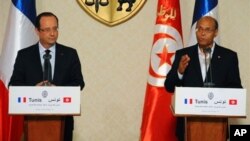PARIS —
French President Francois Hollande and Tunisian President Moncef Marzouki are expressing alarm at the ouster of Egyptian President Mohamed Morsi.
At a joint press conference Thursday in Tunis, Hollande described the unfolding crisis in Egypt as a "failure" for the country's democratic transition, while Marzouki expressed regret at the intervention of armed forces.
Their remarks echoed concerns expressed around the world after the militarily-backed removal of the democratically elected Muslim Brotherhood leader.
Hollande's visit is the first by a sitting French president since Tunisia's 2011 revolution, the popular revolt that inspired similar uprisings across the Arab world, starting with Egypt. He called on Egyptian army officials to organize free, pluralistic and fair elections as soon as possible.
Both presidents dismissed the idea that Egypt's crisis could spread to Tunisia.
"Unlike Egypt," Marzouki said, "Tunisia is not split into warring parties. Tunisia's government aims to be inclusive, and there is dialogue among parties."
Like Egypt, Tunisia's transition to democracy has been bumpy and marred by social protests and concerns over free-speech. Also like Egypt, Tunisia's government is dominated by Islamists -- notably the moderate Ennahda party.
Marzouki, member of a secular party in the coalition government, added that Tunisians know the roadmap ahead, referring to a new constitution and elections slated to be held by year's end.
Analysts weigh in
Amna Guellali of Human Rights Watch says the Muslim Brotherhood's abrupt fall in Egypt may impact Tunisian politics.
"We didn't have, as in Egypt, a kind of autocratic turn after the elections," said the Tunis-based researcher. "It's not the same scenario really, but still I think it will have quite an impact on Ennahda's dealings with the opposition, and also the constitution drafting ... especially when it comes to the definition of the position of Islam in the new constitution, and how this affects rights and freedoms."
For political science professor and Tunisia observer Steven Ekovich, Tunis's Ennahda is markedly different from Egypt's Muslim Brotherhood.
"The big difference between Egypt and Tunisia is that, all along now, Ennahda has been compromising," he said. "Morsi was not compromising."
Egypt's armed forces, he added, has long been a powerful, national player with entrenched economic interests, which poses another key difference when compared to Tunisia.
"Tunisians have a lot of trust in their army, and they know their army is independent," he said, calling it historically absent from the national political scene. "Tunisians not only trust their army, I could almost say they love their army."
Hollande's visit comes as Tunisia faces deep economic problems. Unemployment is high and its key tourism sector is struggling.
The French president signed a number of cooperation agreements, and vowed France would be at Tunisia's side.
At a joint press conference Thursday in Tunis, Hollande described the unfolding crisis in Egypt as a "failure" for the country's democratic transition, while Marzouki expressed regret at the intervention of armed forces.
Their remarks echoed concerns expressed around the world after the militarily-backed removal of the democratically elected Muslim Brotherhood leader.
Hollande's visit is the first by a sitting French president since Tunisia's 2011 revolution, the popular revolt that inspired similar uprisings across the Arab world, starting with Egypt. He called on Egyptian army officials to organize free, pluralistic and fair elections as soon as possible.
Both presidents dismissed the idea that Egypt's crisis could spread to Tunisia.
"Unlike Egypt," Marzouki said, "Tunisia is not split into warring parties. Tunisia's government aims to be inclusive, and there is dialogue among parties."
Like Egypt, Tunisia's transition to democracy has been bumpy and marred by social protests and concerns over free-speech. Also like Egypt, Tunisia's government is dominated by Islamists -- notably the moderate Ennahda party.
Marzouki, member of a secular party in the coalition government, added that Tunisians know the roadmap ahead, referring to a new constitution and elections slated to be held by year's end.
Analysts weigh in
Amna Guellali of Human Rights Watch says the Muslim Brotherhood's abrupt fall in Egypt may impact Tunisian politics.
"We didn't have, as in Egypt, a kind of autocratic turn after the elections," said the Tunis-based researcher. "It's not the same scenario really, but still I think it will have quite an impact on Ennahda's dealings with the opposition, and also the constitution drafting ... especially when it comes to the definition of the position of Islam in the new constitution, and how this affects rights and freedoms."
For political science professor and Tunisia observer Steven Ekovich, Tunis's Ennahda is markedly different from Egypt's Muslim Brotherhood.
"The big difference between Egypt and Tunisia is that, all along now, Ennahda has been compromising," he said. "Morsi was not compromising."
Egypt's armed forces, he added, has long been a powerful, national player with entrenched economic interests, which poses another key difference when compared to Tunisia.
"Tunisians have a lot of trust in their army, and they know their army is independent," he said, calling it historically absent from the national political scene. "Tunisians not only trust their army, I could almost say they love their army."
Hollande's visit comes as Tunisia faces deep economic problems. Unemployment is high and its key tourism sector is struggling.
The French president signed a number of cooperation agreements, and vowed France would be at Tunisia's side.




